
Jule Styne was a British-American song writer and composer best known for a series of Broadway musicals, including several famous frequently-revived shows that also became successful films: Gypsy,Gentlemen Prefer Blondes, and Funny Girl.
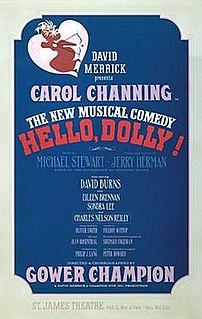
Hello, Dolly! is a 1964 musical with lyrics and music by Jerry Herman and a book by Michael Stewart, based on Thornton Wilder's 1938 farce The Merchant of Yonkers, which Wilder revised and retitled The Matchmaker in 1955. The musical follows the story of Dolly Gallagher Levi, a strong-willed matchmaker, as she travels to Yonkers, New York, to find a match for the miserly "well-known unmarried half-a-millionaire" Horace Vandergelder.

Adolph Green was an American lyricist and playwright who, with long-time collaborator Betty Comden, penned the screenplays and songs for some of the most beloved film musicals, particularly as part of Arthur Freed's production unit at Metro Goldwyn Mayer, during the genre's heyday. Many people thought the pair were married, but in fact they were not a romantic couple at all. Nevertheless, they shared a unique comic genius and sophisticated wit that enabled them to forge a six-decade-long partnership that produced some of Hollywood and Broadway's greatest hits.
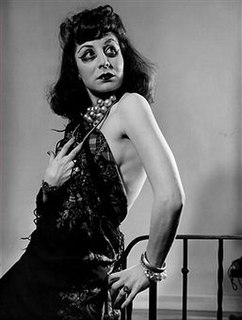
Betty Comden was one-half of the musical-comedy duo Comden and Green, who provided lyrics, libretti, and screenplays to some of the most beloved and successful Hollywood musicals and Broadway shows of the mid-20th century. Her writing partnership with Adolph Green, called "the longest running creative partnership in theatre history", lasted for six decades, during which time they collaborated with other leading entertainment figures such as the famed "Freed Unit" at MGM, Jule Styne, and Leonard Bernstein, and wrote the musical comedy film Singin' in the Rain.
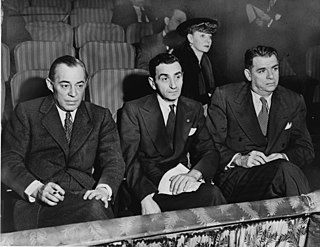
Rodgers and Hammerstein refers to the duo of composer Richard Rodgers (1902–1979) and lyricist-dramatist Oscar Hammerstein II (1895–1960), who together were an influential, innovative and successful American musical theatre writing team. They created a string of popular Broadway musicals in the 1940s and 1950s, initiating what is considered the "golden age" of musical theatre. Five of their Broadway shows, Oklahoma!, Carousel, South Pacific, The King and I and The Sound of Music, were outstanding successes, as was the television broadcast of Cinderella (1957). Of the other four shows that the team produced on Broadway during their lifetimes, Flower Drum Song was well-received, and none was an outright flop. Most of their shows have received frequent revivals around the world, both professional and amateur. Among the many accolades their shows garnered were thirty-four Tony Awards, fifteen Academy Awards, two Pulitzer Prizes and two Grammy Awards.

Gypsy: A Musical Fable is a 1959 musical with music by Jule Styne, lyrics by Stephen Sondheim, and a book by Arthur Laurents. Gypsy is loosely based on the 1957 memoirs of striptease artist Gypsy Rose Lee, and focuses on her mother, Rose, whose name has become synonymous with "the ultimate show business mother." It follows the dreams and efforts of Rose to raise two daughters to perform onstage and casts an affectionate eye on the hardships of show business life. The character of Louise is based on Lee, and the character of June is based on Lee's sister, the actress June Havoc.

Bonita Melody Lysette Langford is an English actress, dancer and singer. She came to prominence as a child star in the 1970s, when she had a notable role in the TV series Just William. In the 1980s, she played companion Mel Bush in Doctor Who. She has also been known for appearing in various musicals in the West End and on Broadway, including shows such as Peter Pan, Cats, The Pirates of Penzance and Chicago. From 2015 to 2018, she portrayed the role of Carmel Kazemi on the BBC soap opera EastEnders, for which she received the 2016 British Soap Award for Best Newcomer.

Bye Bye Birdie is a stage musical with a book by Michael Stewart, lyrics by Lee Adams and music by Charles Strouse.

Leonard Joseph Cariou is a Canadian actor and stage director, best known for his portrayal of Sweeney Todd in the original cast of Sweeney Todd: The Demon Barber of Fleet Street, for which he won the Tony Award for Best Actor in a Musical, and for playing the patriarch Henry Reagan, NYPD Police Commissioner (retired), in the multi-generational television series Blue Bloods on CBS.

Charles Strouse is an American composer and lyricist best known for writing the music to such Broadway musicals as Bye Bye Birdie and Annie.
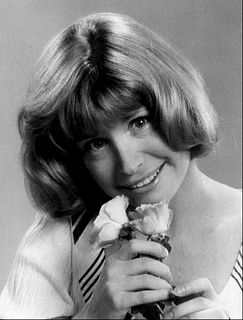
Bonnie Gail Franklin was an American actress, known for her leading role in the television series One Day at a Time (1975–1984). She was nominated for Emmy, Tony and Golden Globe Awards.
Lee Richard Adams is an American lyricist best known for his musical theatre collaboration with Charles Strouse.

Applause is a musical with a book by Betty Comden and Adolph Green, lyrics by Lee Adams, and music by Charles Strouse. The musical is based on the 1950 film All About Eve and the short story on which the movie is based, Mary Orr's "The Wisdom of Eve". The story centers on aging star Margo Channing, who innocently takes a fledgling actress under her wing, unaware that the ruthless Eve is plotting to steal her career and her man.
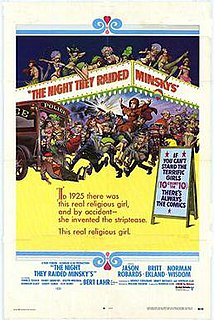
The Night They Raided Minsky's is a 1968 musical comedy film directed by William Friedkin and produced by Norman Lear. It is a fictional account of the invention of the striptease at Minsky's Burlesque in 1925. The film is based on the novel by Rowland Barber, published in 1960.
Thomas Joseph "Thommie" Walsh III was an American dancer, choreographer, director, and author.

Georgy is a musical with a book by Tom Mankiewicz, lyrics by Carole Bayer Sager, and music by George Fischoff.

Lorelei is a musical with a book by Kenny Solms and Gail Parent, lyrics by Betty Comden and Adolph Green, and music by Jule Styne. It is a revision of the Joseph Fields-Anita Loos book for the 1949 production Gentlemen Prefer Blondes and includes many of the Jule Styne-Leo Robin songs written for the original.

Mr. Broadway: Tony Bennett's Greatest Broadway Hits is a 1962 album by Tony Bennett.
William Ferdinand Brown was an American playwright best known for writing the book of the musical, The Wiz (1974), an adaptation of L. Frank Baum's The Wonderful Wizard of Oz with music and lyrics by Charlie Smalls, for which he received a nomination for the Tony Award for Best Book of a Musical.
Gustave Schirmer IV (1918–1992), better known as Gus Schirmer Jr., was a director, producer, and talent agent in film and theatre. Schirmer directed and produced plays that ran On Broadway and Off Broadway. He also helped launch the careers of several actors.
















